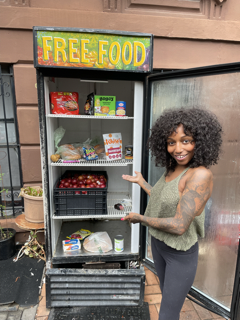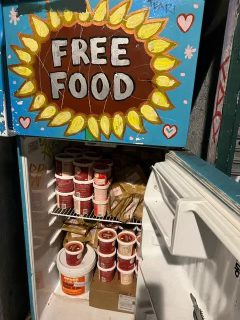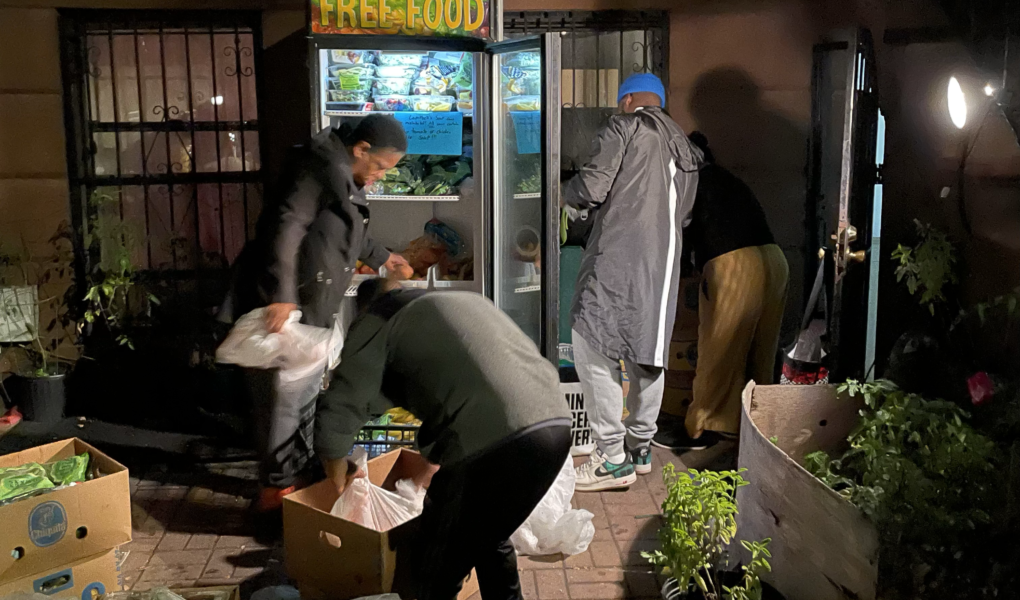The question of food access looms large in Bushwick. Despite the neighborhood’s cultural diversity and vibrancy, residents often find themselves searching for access to affordable, yet healthy food. According to data from the NYC Government, in Bushwick, there are 31 bodegas to every supermarket, while in affluent neighborhoods like the West Village, the ratio is a much better 7 to 1.
As it becomes increasingly clear that food access needs to be improved in neighborhoods with limited supermarkets, often coined as food deserts, many organizations and individuals are creating food initiatives, such as community fridges, innovative gardens, and greenmarkets.
Universe City NYC is one of these organizations. It’s a non-profit indoor farming initiative that aims to change the way food is experienced in the Bushwick-Brownsville area with the focus of improving economic mobility and public health for communities of color.
Franklyn Mena, executive director at Universe City, doesn’t consider the Bushwick-Brownsville area a food desert, but he does consider it an area of food apartheid.
“The reason we’re dealing with food apartheid is because in deserts, things can’t grow,” he said. “Brownsville has the number one amount of garden spaces—but people can’t turn a profit or sustain themselves off the produce grown there.”
According to Mena, the supermarkets that do exist in the area are often filled with produce that’s on its last day of life or covered in pesticides.
“We’re not growing enough in our community to sustain those supermarkets,” he said.
Universe City is looking to combat food apartheid by growing food indoors through all seasons of the year and educating local students on the wonders of controlled agriculture.
“We’re big advocates in our community of wanting to see more buildings used in a green way,” said Mena. “Especially aquaponics and hydroponics.”
Universe City is also involved in the burgeoning community fridge initiative. A community fridge is an outdoor, unrestricted fridge space where people can drop off and pickup food of their choice, often manned by volunteers.
“Our fridge is open twenty-four hours a day and feeds about fifty people daily—people from the shelter, middle-class folks, the homeless, industrial business workers,” he said. “Everybody’s in need of food. There’s level to that need, of course. But everyone needs it.”
Victoria Pitt is a Trinidadian immigrant who found herself relying on a community fridge for support.
“Things were getting a little tight,” she said. “Then one day, I walked by a community fridge, and they were giving out food.”

It was a blessing for Pitt, who immigrated to New York City over thirty years ago. Over time, she found herself wanting to help others in addition to using the services of the fridge. She became an organizer with mutual aid organization In Our Hearts and began picking up things from the fridge for people in her community and delivering it to them.
“It gave me a sense that there are people who need more than me,” she said. “If anyone needs anything I will go pick it up.”
For Pitt, getting more involved with her community has opened her eyes up to the lives of others.
“Being associated with the fridge, you meet so many people from all different walks of life,” she said. “God is good. This is what I can do for somebody else.”
Thadeaus Umpster, an organizer at In Our Hearts who was involved with the creation of the first community fridge in New York City, has witnessed firsthand what the fridges can do for others.
“There are community refrigerators that are in food deserts,” said Umpster. “And we definitely see those fridges make a big impact in terms of bringing options.”
Two years ago, a fridge operated by In Our Hearts received a donation of two tractor trailer trucks full of sliced ham and turkey, which they then distributed. The organization faced backlash and criticism from people who believed that unhealthy, processed deli meats shouldn’t have been handed out in such excess. But quickly, the turkey and ham were gone, accepted by the community.
“It’s food that the community wants,” said Umpster. “We’re not here to tell people what to eat. Especially when it’s food that otherwise would have gone to waste.”

However, Umpster believes that the community fridges are only one piece of the puzzle towards plentiful food access for all.
“A community refrigerator is like comparing a little free library, which is a box of free books, compared to a full bookstore. It’s not the solution for everything, but we are helping.”
Umpster, who is white, also expressed that he does not represent the majority of In Our Hearts’ organizers and community.
“The majority of people who do this type of organizing is women and people of color,” he said. “I don’t visually represent the average organizer.”
Community fridges are only able to operate due to the donations of locals, one such provider being weekly greenmarket Mitch’s Provisions.
Owner Mitch Bloom, who operates out of Bed-Stuy, aims to “remove financial, technological, and geographical barriers to the freshest, most nutritious foods” by weekly ordering farmers-market like products from hundreds of farms in the New York area.
Bloom first got involved with the community fridge network when he needed somewhere to donate the leftover perishables that he couldn’t sell. In addition to donating his leftover items, he has been able to support mutual aid organizers at One Love Community Fridges directly.
“In addition to receiving One Love’s assistance getting my surplus to community fridges after a long day at the market, I’ve been able to connect them to my network of purveyors when they get funding and want to buy fresh, local foods for some of their volunteer events,” he said. “I’ve been deeply touched by all the people who care about food justice.”
Bloom believes Mitch’s Provisions is more of a connector of people in the mutual aid space than simply a business that helps stock community fridges. He has also been involved with food-initiatives outside the community fridge space, most recently working with Blue Star Families food pantry in Staten Island to help with their grand reopening. His business is open to all and takes EBT. “I’m inspired every day by the countless people who work tirelessly for and with non-profit organizations, mutual aid organizations, and social enterprises,” he said.




